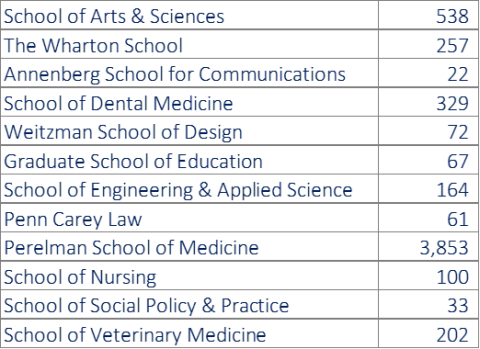How to use the database
We used the United Nations Sustainable Development Goals (SDGs) as a framework to understand how the teaching and research of Penn’s faculty members connect to global priorities. Click on the graphics below to explore our results to date. Data can be sorted by SDG or by school. Penn faculty members may request lists of faculty sorted by single or multiple SDGs.
Please note this database was last updated in 2024.Key Statistics
12
1,250
1,916
Our Analysis
This program aims to illuminate Penn’s distinctive strengths in generating knowledge to support solutions to global challenges while also resulting in a searchable database to foster transdisciplinary research. We used the United Nations Sustainable Development Goals (SDGs) as a classification system, as the 17 goals offer a universal platform for today’s most pressing global challenges.
Methodology
Our first approach was to deploy an interdisciplinary team of students to analyze the teaching and research of faculty members. Each student assistant assumed responsibility for batches of academic units. They reviewed the biographies, course descriptions, websites, and publications of each faculty member in that unit using an online form to ensure consistency. While thorough, this method was time-consuming and subject to human bias.
In partnership with Penn Libraries, the Initiative tested a second approach using the Dimensions research database to find faculty members whose research fields connect with one or more SDGs. Based on an analysis of publications between January 2018 and January 2023, we identified Penn faculty members across the 12 schools whose research connects to one or more goals (Total connections). The automated SDG categorization developed by Dimensions relies on supervised machine learning algorithms trained with specific search queries involving the 17 Goals, their associated targets (169), and unique indicators (232). Learn more.
Faculty (January 2024)
A total of 5,698 faculty were included in the analysis, excluding instructional staff. Find total faculty by school below.

Publication
Committed to share knowledge and foster collaborations, EII published a chapter in the North American and European Perspective on Sustainability in Higher Education.
Acknowledgements
The Environmental Innovations Initiative team thanks all the dedicated student assistants who contributed their time and expertise. We are also profoundly grateful for the help of Penn Librarians Manuel de la Cruz Gutierrez (Penn Libraries), and Jessica Atkins & Jordan Yiu (Penn Medicine’s Global Services Interns); their support and dedication are pivotal for this project and its future iterations. The faculty database would not exist without the collective efforts of these individuals and institutions.
Inquiries
If you would like to know more about how Penn's research connects to global priorities please feel free to submit your inquiries.